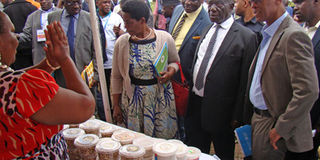Museveni assures Uganda on food security, exports

In attendance. Vice President Edward Ssekandi (3rd left) inspects exhibitors’ stalls at Bulindi Zonal Agriculture Research and Development Institute during the World Food Day celebrations in Hoima District on Wednesday. PHOTO BY FRANCIS MUGERWA
What you need to know:
- The Minister of Agriculture, Mr Vincent Ssempijja, said government plans to register and train farmers countrywide, who are ready to tap into the huge export market in Europe, China, US, and other areas.
President Museveni has said Uganda is a food secure country and is exporting the surplus to neighbouring countries.
“Food security analysis for Uganda indicates that generally, 83.6 per cent of the total population was classified as being food secure,” the Vice President, Mr Edward Kiwanuka Ssekandi, who read President Museveni’s speech at the International World Food Day celebrations on Wednesday, said.
The celebrations under the theme “Our Actions are our Future. Healthy Diets for a zero Hunger World” were held at Bulindi Zonal Agriculture Research and Development Institute (Bulindi ZARDI) in Hoima District.
He said Ugandans have adequate food to cover their minimal food energy requirements and it can be accessed at family level and in markets.
The President also said government continues to prioritise agriculture as one of the important sectors for Uganda’s economy in terms of offering employment, food security and wealth creation.
The agriculture sector contributes 25 per cent of national Gross Domestic Product (GDP) and employs more than 70 per cent of Uganda’s population.
“Agricultural export earnings rose by 9.6 per cent to $3.93 billion (about Shs14.4 trillion) in the period of July 2018 to March 2019 from $3.59 billion (about Shs13.3 trillion) a year earlier. This increase was mainly on account of a rise in the export volumes of coffee, tea, maize and beans. This is a result of continued investment in agriculture,” the President said.
At the climax of the celebrations, Uganda also celebrated the birthday of the Food and Agriculture Organisation of the United Nations, which was found on October 16, 1945.
Malnutrition
The President expressed concern over rampant cases of malnutrition.
Mr Museveni said malnutrition affects agricultural productivity, especially women who provide 60 to 70 per cent of labour in farming activities. This, he said arises from heavy workload that includes gardening, fetching water, and collecting firewood and home chores.
The President said annually, close to 170,000 children are born underweight and this leads to $5 million (about Shs18.4b) spent on incubation facilities while 16,000 who die of low birth weight cause a loss of $ 38 million (about Shs140b).
“Improving nutrition status requires increasing agricultural production and productivity, food distribution, food access, utilisation of food resources and nutrition education programs to improve knowledge and skills in meal preparation,” the President said.
He added that government is promoting the Integration of Agriculture, Energy, ICT, Transport as well as manufacturing in order to boost the supply and reliability of agricultural raw materials for the industrial sector, creating jobs for non-farming communities.
The Bugahya County MP, Mr Pius Wakabi, demand government’s interventions in curbing environmental degradation, promote agricultural mechanisation through providing a tractor in each parish.
He requested government to support cash crop growing farmers with more resources to enable them diversify their production.
EXPORT MARKET
The Minister of Agriculture, Mr Vincent Ssempijja, said government plans to register and train farmers countrywide, who are ready to tap into the huge export market in Europe, China, US, and other areas.
He said the agriculture Ministry has recruited 3,063 extension workers across the country creating extension worker to farmer ratio of 1:1800.
“This is an improvement from the initial ration of 1:5000 in the 2015/2016 Financial Year at the time of reform. The extension staff have been trained and equipped with transport equipment and an operational fund to enable extension workers reach out to as many farmers as possible and teach them on how to increase agriculture production, productivity, and market access,” Mr Ssempijja said.




